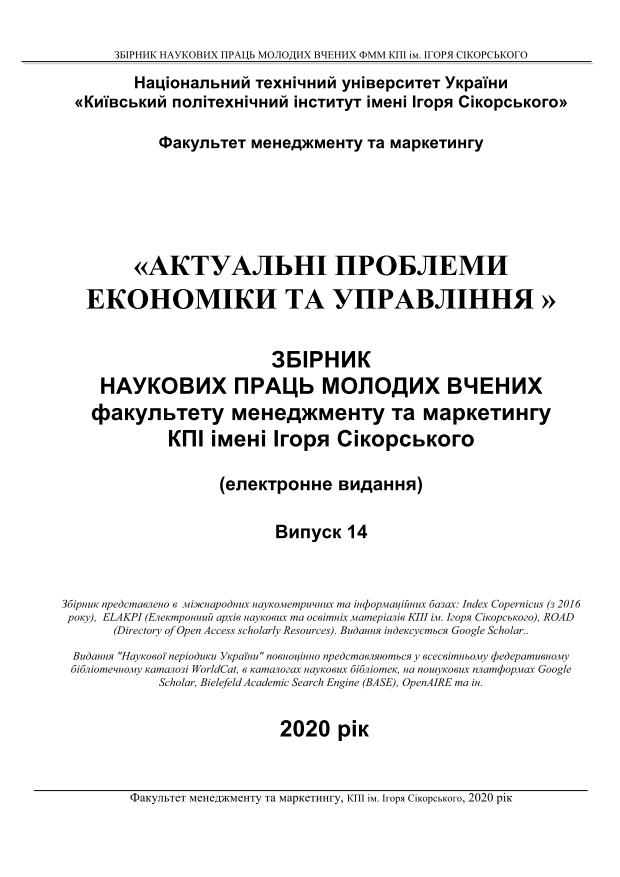METHODOLOGY OF SELECTING AN INVESTMENT PROJECT IN THE EVENT OF EXPERTS’ DECISIONS INCONSISTENCY
Ключові слова:
investment project, making collective decisions, expert evaluation, Bayesian strategy, optimal solutionАнотація
The article studies the decision-making process on the choice of an investment project. The relevance of this study is of particular importance with limited funding, which is currently the case in Ukraine. The traditional criteria for choosing investment projects are: the criterion of net present value, the criterion of the internal rate of return, the criterion for the return period, the criterion for the return rate and the criterion for additional return. At the same time, one cannot rely solely on economic indicators, since it is an individual who makes a decision. Therefore, it is more reasonable to rely on the knowledge, experience and intuition of a group of independent experts in the relevant subject area. A review of existing methods for making collective decisions, including their application to the selection of investment projects, is conducted. Their advantages and disadvantages are noted. The expediency of applying Bayesian strategies for choosing an investment project is emphasized, since this approach allows one to integrate individual expert decisions based on a formal criterion. A developed optimal decision-making methodology provides the choice or rejection of an investment project using the Bayesian collective decision strategy. It is noted that any investment project, including the one under consideration, can be successful, i.e. make a profit or to be unsuccessful. Based on historical statistics of previously accepted investment projects, the probabilities of successful and unsuccessful projects are estimated. The developed methodology was applied to make a collective decision on the possibility of financing the current investment project by an expert group of five people. According to the applied methodology, all experts make decisions independently of each other. For each expert, a distribution of conditional probabilities of erroneous decisions is induced. The situation of collective decision making is determined. The groups of experts who made agreed decisions, were identified. A formal algorithm is applied to make an optimal collective decision. An investment project has been qualified for financing.
Посилання
Gricenko L. L. Derzhavna investicijna politika: sutnist, cili ta zavdannya. // Naukovi praci Kirovogradskogo nacionalnogo tehnichnogo universitetu. Ekonomichni naukiyu 2012. Vip. 22(2), p. 89-95.
Armeanu D., Enciu A., Poanta D. Characteristics of Criteria for Selecting Investment Projects under Uncertainty. // Theoretical and Applied Economics Volulme XVIII (2011), No. 7(560), pp. 5–18.
Orlov A. I. Ekonometrika. Uchebnik. M.: Izdatelstvo "Ekzamen", 2002. - 576s.Buchanan J., Sheppard P. Ranking Projects Using the ELECTRE Method. URL: http://citeseerx.ist.psu.edu/viewdoc/versions?doi=10.1.1.42.11 (access date: 18.12.2019)
Rouyendegh B. D., Erol S. Selecting the Best Project Using the Fuzzy ELECTRE Method // Mathematical Problems in Engineering Volume 2012, Article ID 790142.
Govindan K., Jepsen M.B. ELECTRE: A Comprehensive Literature Review on Methodologies and Applications // European Journal of Operation Research. 2016. Vol. 250, Issue 1. P. 1–29.
Zhukovska O. A., Fajnzilberg L. S. Matematichni modeli kolektivnih rishen: monografiya. Kiyiv: Osvita Ukrayini, 2018. 160 p. URL: http://ela.kpi.ua/handle/123456789/23456 .
Fajnzilberg L.S. Bajesova shema prinyatiya kollektivnyh reshenij v usloviyah protivorechij // Problemy upravleniya i informatiki. 2002. №3. p. 112–122.
O’Cinneide C. Bayesian Methods In Investing // The Oxford Handbook of Quantitative Asset Management. 2012. DOI: 10.1093/oxfordhb/9780199553433.013.0006
##submission.downloads##
Опубліковано
Номер
Розділ
Ліцензія
Редакція дотримується політики CC-BY.
© Авторські права авторів статей захищено відповідно до законодавства України
Розміщуючи матеріали у збірнику наукових праць автори погоджуються з правом редакції збірника розміщувати матеріали збірника в електронному вигляді на офіційному сайті збірника та інших електронних ресурсах відповідно до законодавства України.

